 |
Qorus Integration Engine® Enterprise Edition 7.0.6_prod
|
 |
Qorus Integration Engine® Enterprise Edition 7.0.6_prod
|
Back to the Developer's Guide Table of Contents
Qorus can be used for the following use cases:
This documentation describes how to develop integration as well as AI/ML/Data Science solutions with Qorus Integration Engine™.
Qorus is designed to support no-code/low-code solutions by combining configurable building blocks in end-to-end solutions to solve simple and complex IT integration and automation challenges.
Building blocks are generally defined as class objects, which are a combination of code and configuration that make the code generically useful in as many use cases as possible.
Code in Qorus can be defined in any of the following programming languages:
The concept of using a dynamically-typed language such as Python in an IT data and process orchestration / automation solution, embedded in a rigid framework to provide interface reliability, error recoverability, and operational traceability such as with Qorus Integration Engine™, results in extremely fast and flexible development and very high operational reliability. This leads directly to lower development and operational costs, greater business flexibility, and higher process quality.
Java is a compiled language bringing enterprise capabilities to Qorus and can be used as the primary language for building-block development, or it can be mixed with Python and Qore code or with no-code building-blocks regardless or the language as needed.
The Qore language is an enabling technology that provides the infrastructure necessary to allow Java and Python to be seamlessly integrated, allowing Python-based AI and data science functionality to interface directly with enterprise systems, data, and protocols through Java APIs.
Qorus code can use APIs in any supported programming language equally; dynamic imports of APIs in other languages are supported in each language; Python can dynamically import Java and Qore APIs, and Java also can dynamically import Python and Qore APIs in the same way using standard import statements in each language.
This low-level language integration is one way that Qorus enables powerful AI/ML/Data Science solutions to easily integrate with enterprise data sources as well as to power fault-tolerant process orchestration.
Another important aspect of Qorus is the Visual-Studio-Code-based IDE, which enables non-expert users to put together and configure end-to-end solutions without coding using building blocks, as well as permitting expert users to build and extend reusable and generic functionality combining code and metadata in building blocks, empowering operations and non-technical users as well as experts to deliver complex end-to-end IT integration and automation solutions on Qorus in less time and with less risk than with alternative solutions.
Qorus supports Python, Java, and Qore for coding, and each language has its own advantages and disadvantages, however due to the fact that Qore provides the glue that links Python and Java together, all three languages can import and use APIs from the other two.
Qorus Language Table
| Attribute | Python | Java | Qore |
| Threading | Poor | Excellent | Excellent |
| Memory Footprint | Large | Large | Small |
| Sandboxing | Poor | Possible | Excellent |
import statements; when importing Qore or Python APIs into Java, wrapper classes for the imported APIs are generated automatically using Qorus's dynamic bytecode generation, for example.Qorus is a "no-code platform for coders", because it supports coding and also wrapping code into reusable objects driven by configuration as well. This allows developers to prototype solutions and then deliver solutions as reusable, self-documenting components to reduce time, risk, and cost of solving similar problems in the future, as well as reducing the time, risk, and cost of software maintenance of such solutions.
In addition to configuring existing integration objects, all Qorus integration objects backed by code can be implemented, extended, or customized with the Qorus IDE.
No-Code / Low-Code Objects
| No-Code / Low-Code Object | Description | Code | Description |
| Class | Fundamental logic element of Qorus | Yes | Classes allow logic to be encapsulated and made generic by declaring configuration and other attributes that enable classes to be self-documenting, to work in generic contexts, and to be deployed and used by non-expert users |
| Class Connections | Linear logic flow for interfaces | Yes | Each element in a class connection is either a class connector or a mapper, each of which can be supported by code (in the case of class connectors, there is always code) |
| Connection | Connection to an external system or data | No | Connections are made up of configuration data and do not contain any code |
| Connector | Simple linear logic element in a class | Yes | Connectors are special methods in a classes that can be used along with mappers in class connections to be executed as linear logic on a certain event |
| Data Pipeline | Data processing pipelines | Yes | Data pipeline processors are backed by code at the implementation level; mappers are mostly configuration, but can be customized with code as well |
| Qogs | Graphically-created logic flows that can be used in place of code anywhere in Qorus | Yes | Qogs are made up of states, some of which (ex: class connector states) are backed by code (classes) at the implementation level |
| Group | Interface groups | No | Groups are made up of pure configuration |
| Job | Scheduled tasks with an audit trail | Yes | Jobs are backed by code at the lowest level |
| Mapper | Data transformation objects | Yes | Mappers are mostly made up of configuration but can be customized with code as well |
| Queue | Asynchronous queues | No | Queues are made up of pure configuration and data |
| Service | APIs, protocol handlers, data cache, event listeners, etc | Yes | Services and service methods are backed by code at the implementation level |
| Step | An atomic logic element in a workflow | Yes | Steps are implemented with classes, Qogs, or with class connectors, all of which are backed by code at the implementation level |
| Type | Data type definitions | No | Types describe data types to ensure type-safe data transfers and internal and external communications with Qorus |
| Value Map | Lookup tables | No | Value maps are made up of pure configuration and data and do not contain any code |
| Workflow | Stateful IT process orchestration | Yes | Steps and workflow methods are backed by code at the implementation level |
| Workflow Synchronization Event | Used to synchronize workflow processing | No | Workflow synchronization events are made up of pure configuration and data and do not contain any code |
The primary way to package code in a reusable, self-documenting object in Qorus is to implement the code in an object that supports config items, therefore config items are one of the main vehicles for enabling developers to package their code as self-documenting no-code objects.
Config items are provided as metadata in supported objects and allow users to control the behavior of the object's code at runtime. Because objects that support config items also support builtin documentation in the form of markdown description fields, this enables objects supporting a combination of code and config items to be reusable and self-documenting.
Here is a view of the IDE where config items can be created or edited:
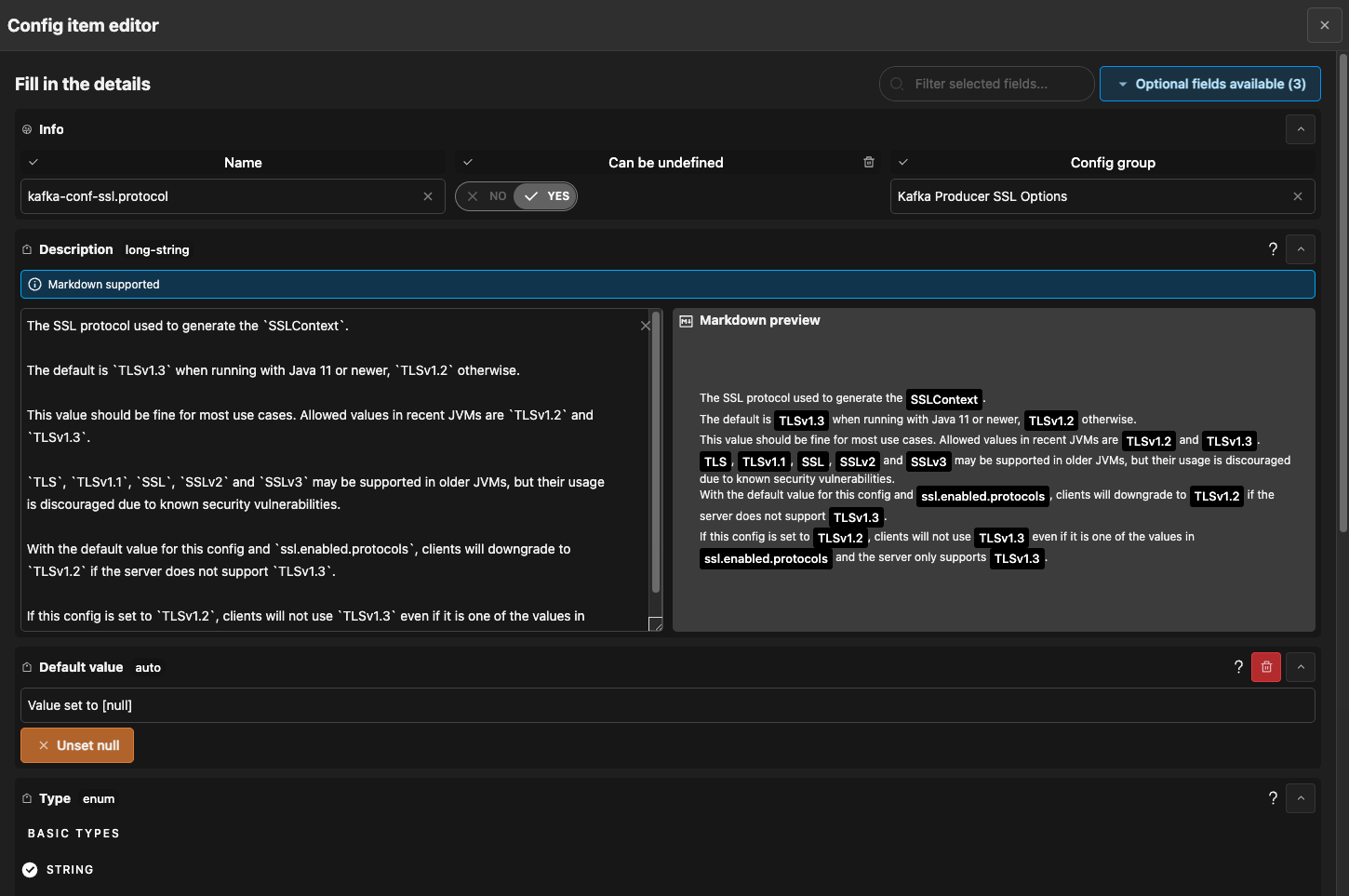
Config items have the properties given in the following table.
Config Item Properties
| Property | Type | Description |
allowed_values | list | A list of discrete allowed values for the config item; if set then the user will have to choose from a value in this list to set the config item's value |
config_group | string | The name of the configuration group; used to separate config items logically in UIs |
default_value | any | Any default value for the config item |
description | string | The markdown description of the config item and how its value affects the behavior of the code at runtime |
name | string | The string value that is used with API calls to use the config item at runtime |
strictly_local | bool | If true then the config item only takes local values and cannot be set with a global config item value |
type | string | The data type of the config item |
Then config items can be used at runtime with API calls to UserApi::getConfigItemValue() in the code as in the following examples.
Config item values can be set from the IDE as in the following graphic.
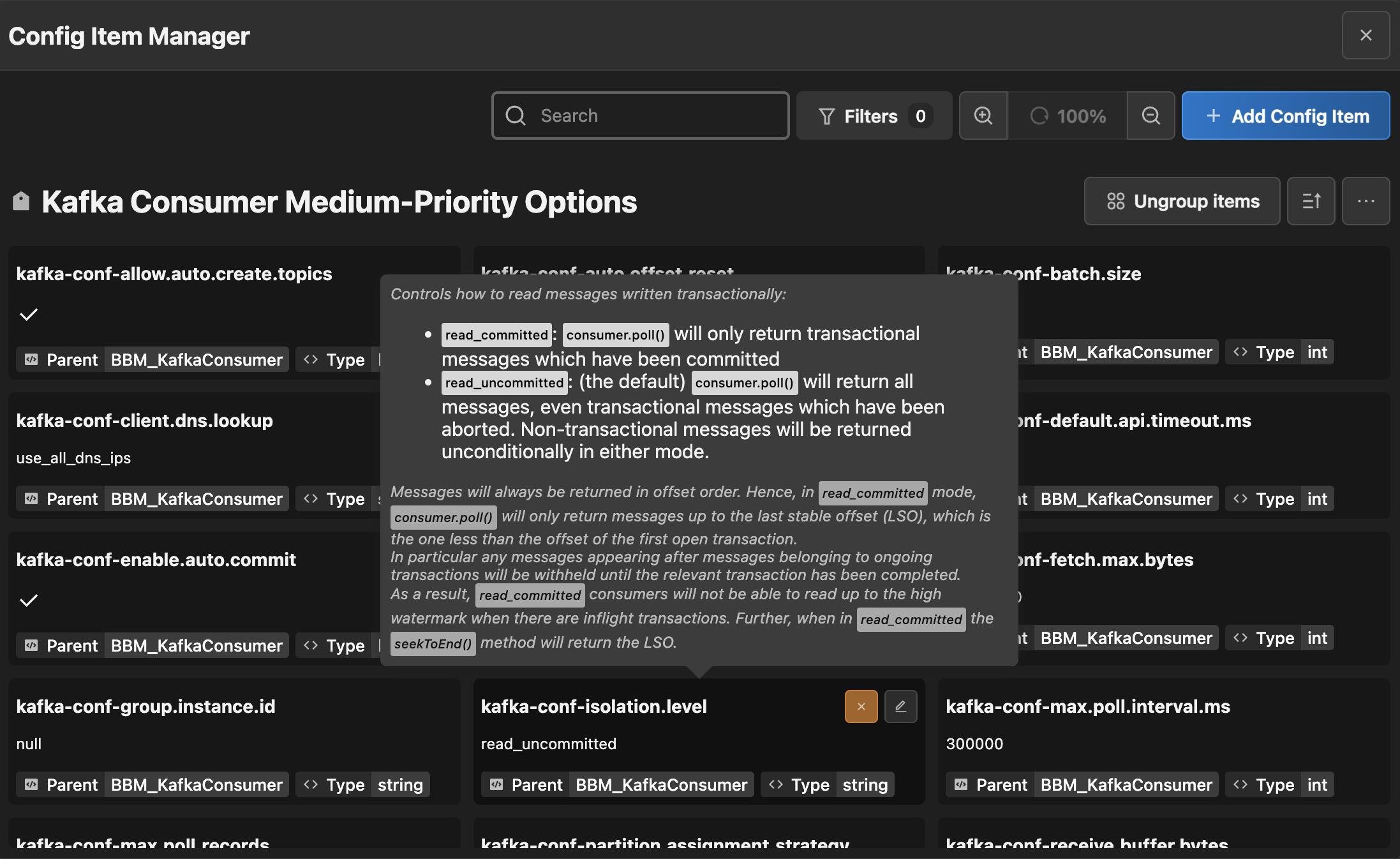
Config item values can also be set from the UI as in the following graphic.
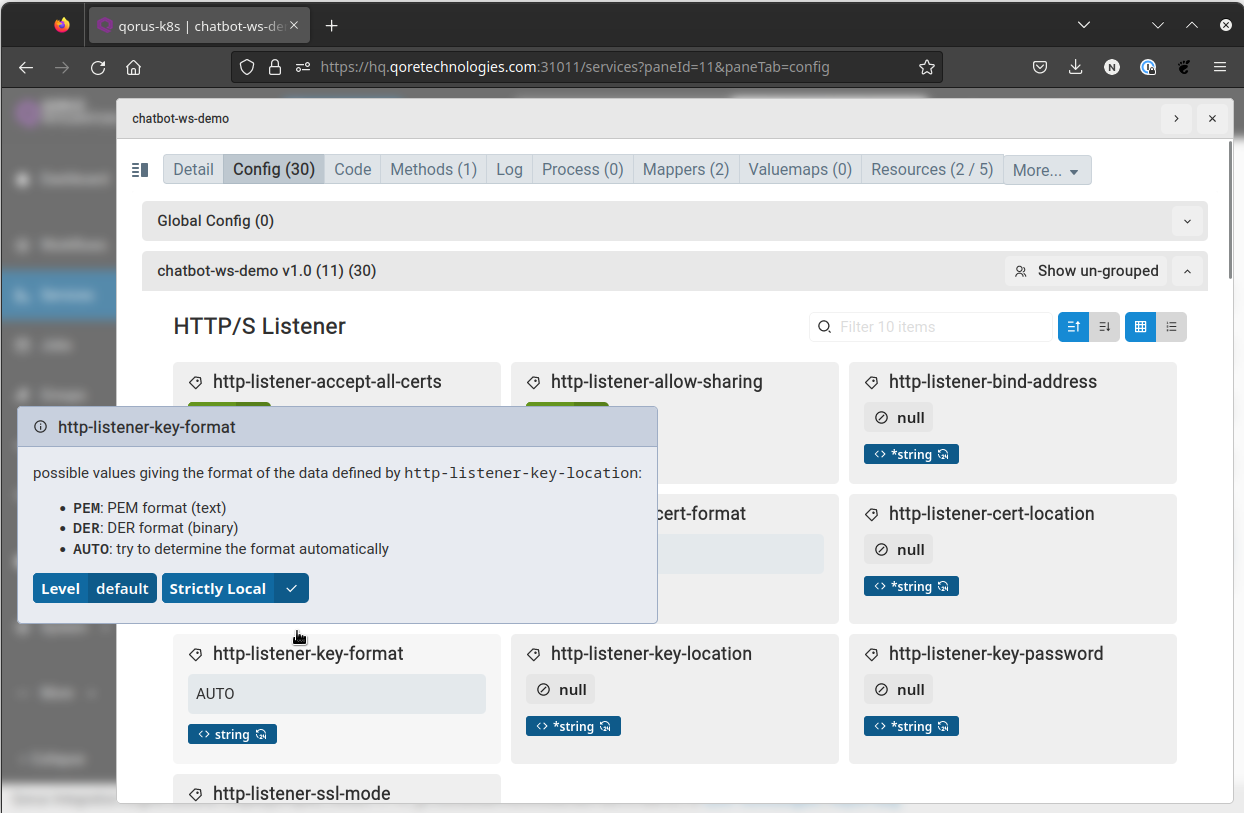
Config item values can also be set from the command line - ex:
prompt$ qrest put jobs/my-job/config/my-config-item value=100
The following objects support config items in Qorus:
Flows / Qogs allow developers to implement logic graphically.
This makes the implementation clear and self-documenting, which, combined with a full set of tests for a release, results in reduced time and risk for subsequent changes and inevitable future software maintenance.
Qorus Qogs allow for building blocks, DataProvider actions, data transformations (with mappers), logical loops and variables, API calls, and more to be implemented with a graphical, self-documenting approach.
Qogs can be reused and nested as needed as well, just like real code.
Qogs can be used as:
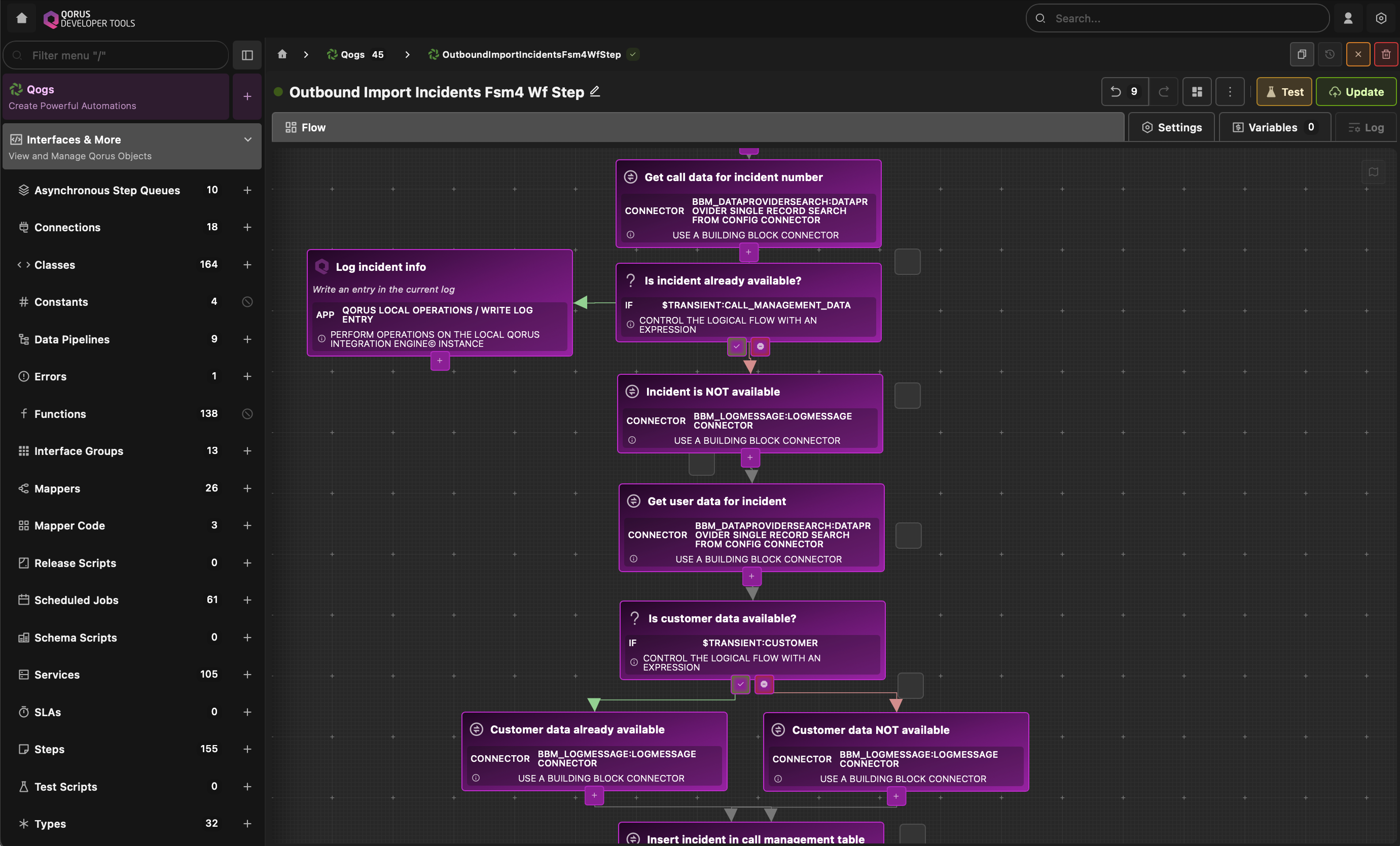
The three main integration objects in Qorus are:
Workflow are all about order data. If you have order data that must be processed, and the order data should complete processing despite technical errors, then a workflow should be used.
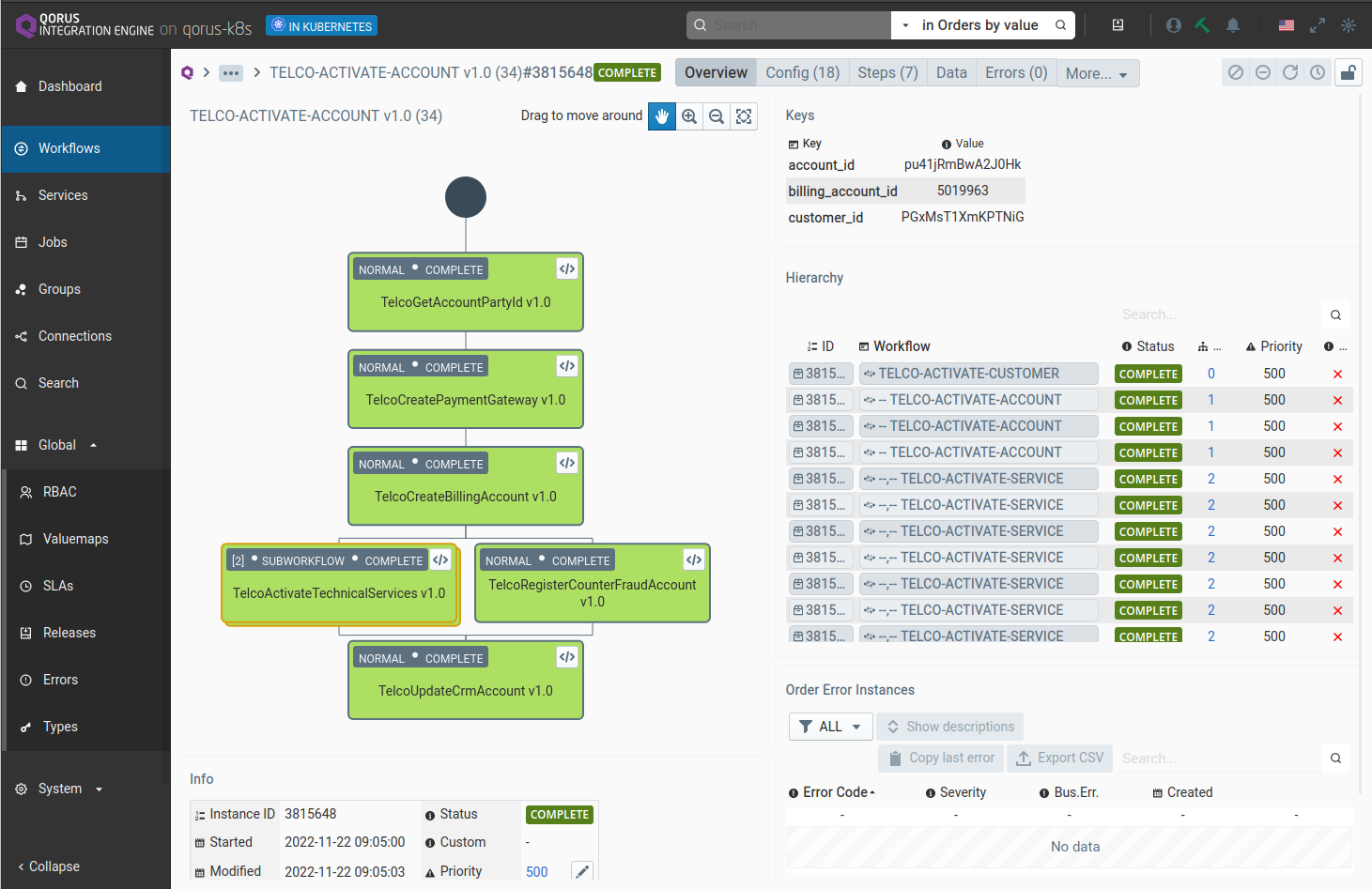
Conversely, if you don't have any order data, then as a rule of thumb, you should not create a workflow order until the order has been acquired (with a job or a service). The uniqueness of workflow orders can be guaranteed with unique order keys in the action or API used to create the order.
Qorus workflows automatically track order execution time as a configurable SLA and are very good for tasks that include asynchrononous coordination with internal and external events as well.
Workflows can also handle hierarchical order processing using subworkflow steps, which are also used for logical branching in workflows, since Qorus workflows have otherwise a fixed structure.
Workflows are made up of atomic steps that represent the bulk of the processing logic to be applied to order data; when all steps in a workflow order get a COMPLETE status, the workflow order itself is also COMPLETE.
Steps are defined by subclassing the appropriate step class in any supported language (using dynamic imports in Python and Java, for example) and can be built with a no-code, low-code, or an "only code" approach in Qorus.
Workflows and steps are versioned; new versions of steps and workflows can be deployed to a running system while the workflow itself is running, however workflows and steps can each have multiple versions of the same workflow and step active at the same time, and please note that workflow and step versioning affects processing and specifically recovery processing; see Workflow Error Recoverability and Workflow Upgrades, Bug Fixes, and Recovery Compatibility for more information.
Qorus jobs are for tasks that run on a schedule. Each execution of the job results in a record (with a COMPLETE or ERROR status, plus optional free-form data) which is searchable / retrievable from the REST API and visible in the system UI.
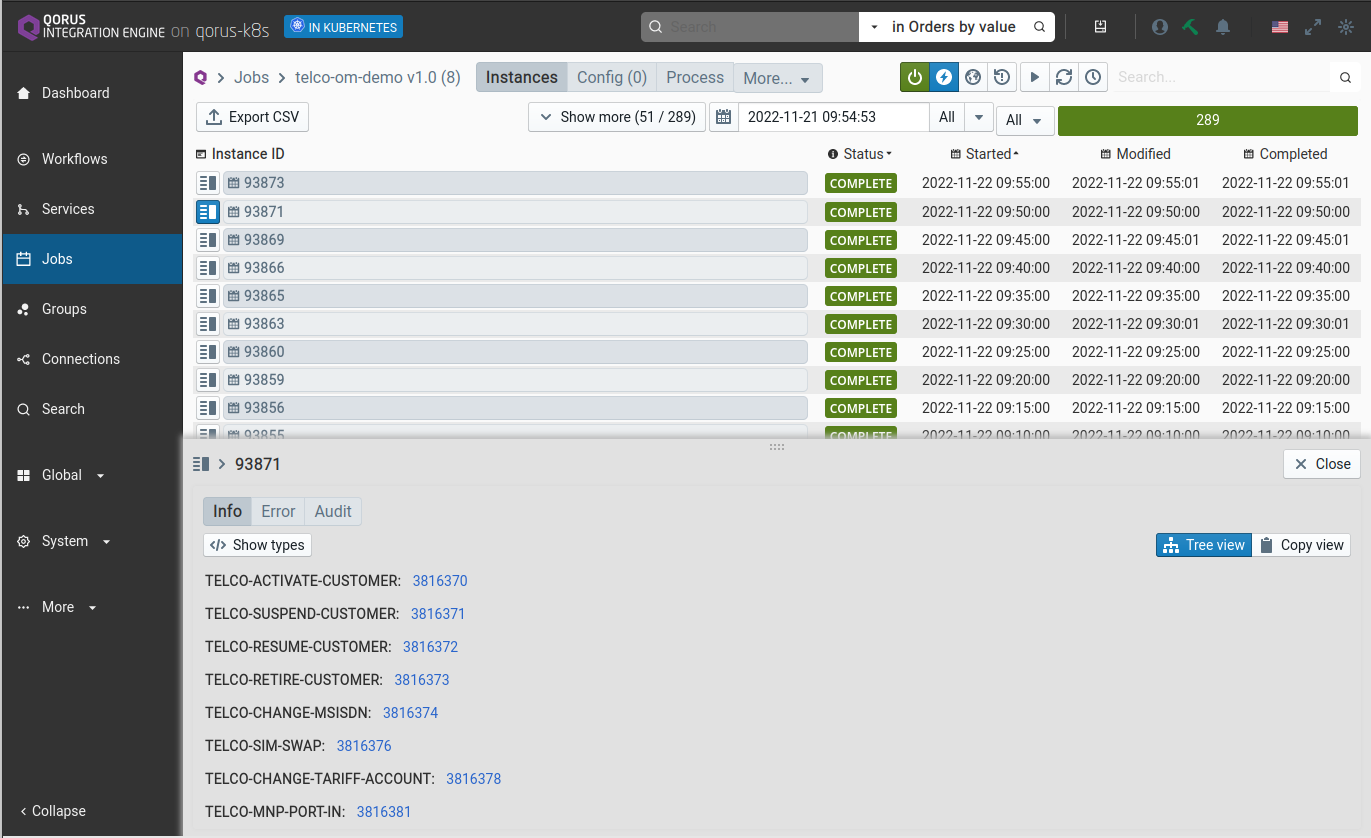
Jobs are suitable for polling tasks and more generally for activity that runs on a schedule.
Jobs are defined by subclassing the QorusJob class in any supported language (using dynamic imports in Python and Java, for example) and can be built with a no-code, low-code, or an "only code" approach in Qorus.
Only one version of a job can be active in Qorus at any other time. A new version of a job can be deployed to a running Qorus instance at any time, however the old version of the job will be replaced by the new version.
Qorus services are a powerful and flexible integration object that can perform many tasks; services can implement server-side REST, SOAP, HTTP, WebSocket, stream handlers, or other protocol handlers; they can implement a data cache, event listeners, and more; services are the only Qorus integration object that can start its own threads as well.
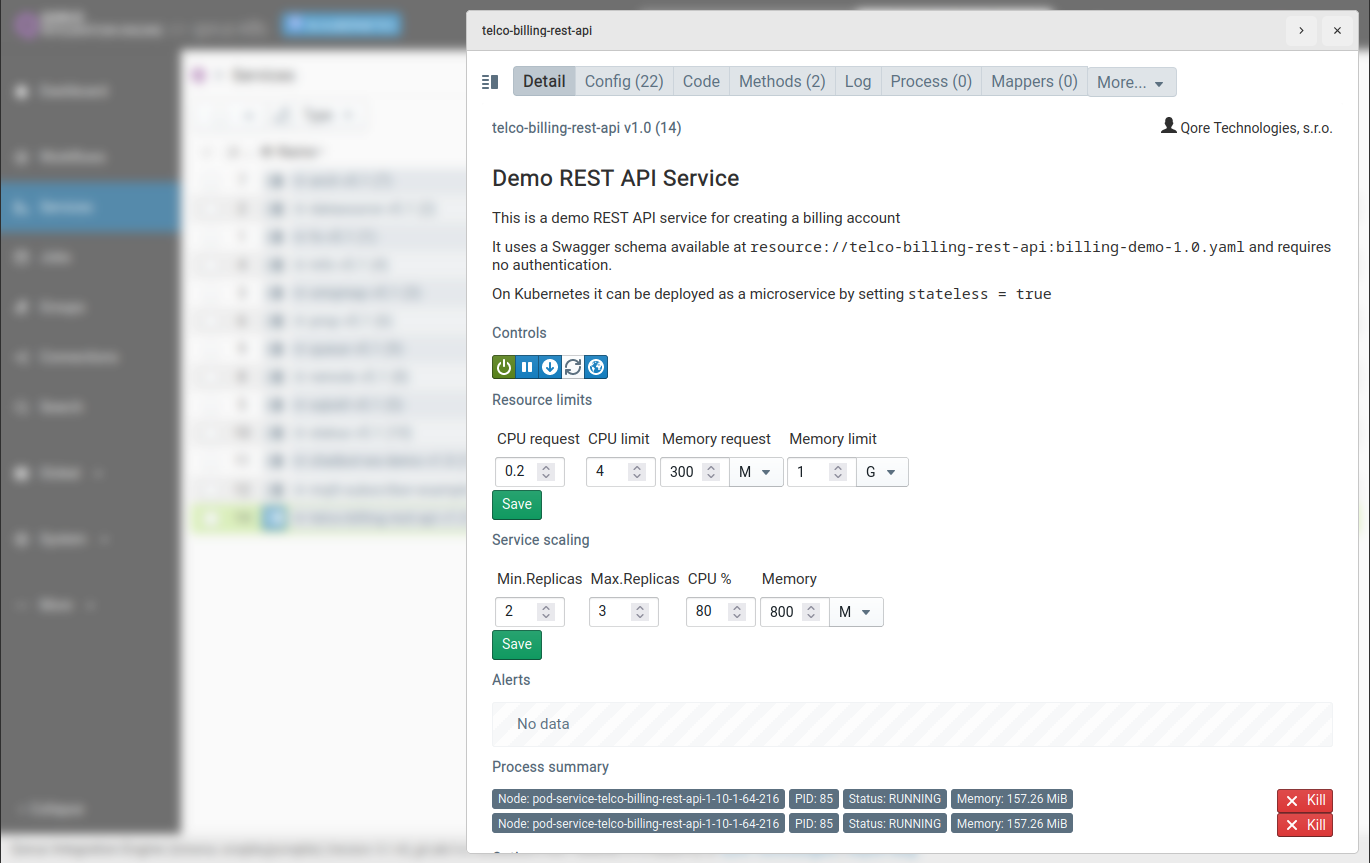
Services are defined by subclassing the QorusService class in any supported language (using dynamic imports in Python and Java, for example) and can be built with a no-code, low-code, or an "only code" approach in Qorus.
Only one version of a service can be active in Qorus at any other time. A new version of a service can be deployed to a running Qorus instance at any time, however the old version of the service will be replaced by the new version.